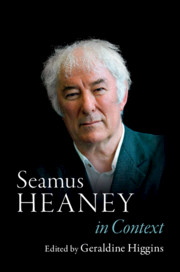Book contents
- Seamus Heaney in Context
- Seamus Heaney in Context
- Copyright page
- Dedication
- Contents
- Contributors
- Acknowledgements
- Abbreviations
- Introduction
- I Mapping
- II Influences and Traditions
- III Poetics
- IV Publishing
- V Frameworks
- Chapter 19 Catholicism
- Chapter 20 Classical Roots
- Chapter 21 Politics
- Chapter 22 Education
- Chapter 23 War and Peace
- VI Critical Contexts
- VII Legacy
- Index
Chapter 20 - Classical Roots
from V - Frameworks
Published online by Cambridge University Press: 15 March 2021
- Seamus Heaney in Context
- Seamus Heaney in Context
- Copyright page
- Dedication
- Contents
- Contributors
- Acknowledgements
- Abbreviations
- Introduction
- I Mapping
- II Influences and Traditions
- III Poetics
- IV Publishing
- V Frameworks
- Chapter 19 Catholicism
- Chapter 20 Classical Roots
- Chapter 21 Politics
- Chapter 22 Education
- Chapter 23 War and Peace
- VI Critical Contexts
- VII Legacy
- Index
Summary
This chapter is an overview of the ways in which Seamus Heaney engages with Greek and Latin mythologies and literatures in his work, from Death of a Naturalist (1966) to Aeneid VI (2016), and from allusions to more sustained forms of intertexuality, including versions. First discussing classical presences in his early poetry, the chapter shows how Heaney became increasingly interested in Greek and Latin literatures after the late 1980s, at a time of personal and political crises in Northern Ireland. It explains that, in those years, classical texts helped him address family deaths as well as contemporary violence in the North. Finally, it argues that in his rewritings of Sophocles, and in his classical poetry, mostly inspired by Virgil, Heaney ultimately revisits Ireland as a classical and secular space, reflecting social and cultural changes on the island, in the context of the Northern Irish peace process, as well as of globalisation.
Keywords
- Type
- Chapter
- Information
- Seamus Heaney in Context , pp. 221 - 230Publisher: Cambridge University PressPrint publication year: 2021

